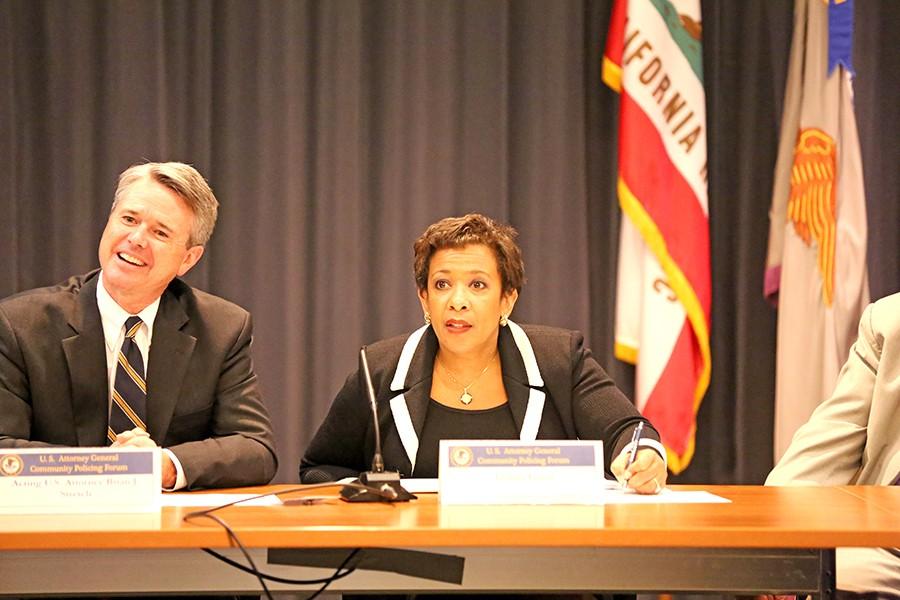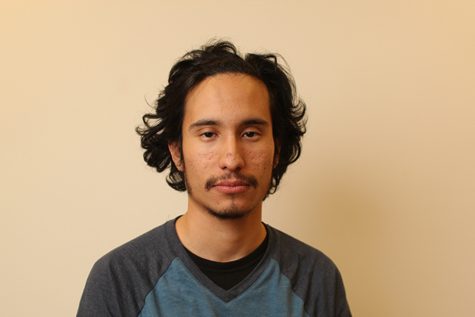Lynch visits Richmond, gives community hope
Attorney General’s national tour aims to restore relations between police, community
Christian Urrutia / The Advocate
U.S. Attorney for the Northern District of California Brian Stretch and U.S. Attorney General Loretta Lynch listen to community members during her visit on Friday at the Civic Center Auditorium.
Sep 30, 2015
RICHMOND — U.S. Attorney General Loretta Lynch visited the Civic Center Plaza on Friday to meet with community and school leaders, the Richmond Police Department and other Contra Costa County officials as part of national tour focusing on improving community policing relations.
Lynch met with officers from Richmond PD, female law enforcement chiefs and local youth to hold a closed session round-table discussion with representatives from community organizations and schools to address problems and concerns facing their town.
Her nationwide tour consists of six cities: Cincinnati, Ohio; Birmingham, Alabama; Seattle, Washington; Pittsburgh, Pennsylvania; and East Haven, Connecticut. She said traveling to these cities is geared toward highlighting positive police practices and restoring trust between communities and police officers.
“I’ve been looking at many issues facing us,” Lynch said. “And I think, frankly, none are more important than police and community relations in this day and age.
“I’m really here to highlight the work that is being done in different communities around the country.”
Richmond Mayor Tom Butt said, “This is about community policing and public safety and at the end of the day, successful community policing is an important part of building trust in the community.”
Butt also said, “It’s every citizen out there in Richmond who has made (community policing) work and we’re proud to share the successes we’ve had with other people, but we solicit their successes with us for their advice and solicit all the help we can get — so thank you Attorney General (Lynch) for (coming to Richmond).”
Richmond Police Chief Chris Magnus said that the city has struggled with a lot of challenges including poverty and a lack of social and economic resources, but has persevered with “great amounts of pride and determination and a willingness to try new things — the people around this room are a testament to that fact.”
Magnus added that building trust is an ongoing process and it is not simply a destination one arrives at.
“Relationships take many years to form and they are fragile,” he said. “And that trust that sustains them can be easily, easily broken.”
He also said how hard it is to maintain energy and focus when people are dealing with everyday challenges in Richmond.
Lynch said, “What I’ve seen across the country is when all these (community) groups come together and decide to break down their barriers and create a new direction to change not only what’s possible but (also) what happens.”
She said that the reflection of community policing that people may have an idea of often comes down to what is being caught on tape, but those incidents reflect years and generations of negative interaction and mistrust that come together in “flash-point situations” and turn into conflagrations.
She added this happens when there is no way of, or mechanism, for the people involved to handle cases and the subsequent emotions and the history that go into so various (conflicting) situations.
Protesters against police brutality, organized by The Oscar Grant Committee Against Police Brutality and State Repression and the family of Richard “Pedie” Perez, who was unarmed when Richmond Police Officer Wallace Jensen shot and killed him during an arrest on Sept. 14, 2014, rallied outside City Hall.
The family has filed a federal lawsuit and an appeal last year following Perez’s death, but was immediately dismissed by Contra Costa County District Attorney’s Office.
His father, Rick Perez, was quoted in the press packet released by the committee as saying, “I just want flat out justice, if the facts are that the cop did what I think he did, well we don’t need cops like that.”



